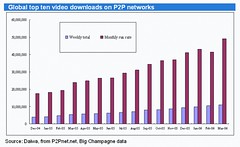Blurred visionWhen people talk about VON blur, they are not exaggerating. Returning to my room last night with coffee poisoning and relentless jetlag, and faced with a sense of duty to write about what I had seen in the past few hours, I just couldn't get it organized and gave up on it. Luckily, my uber-mega value freund Richard Stastny has done a typically good job of summarizing the
high points and
low points of day one of VON here in lovely San Jose. I would only add a few things to his commentary (also,
Brough, whom Richard missed, was excellent).
It was an admirable act of bravery for Mr. Notebaert from Qwest to appear before such an unsympathetic audience, but the message was pretty much "Whitacre Lite." His
keynote was a tense affair, and as Richard notes there were indeed repeated references to NDAs regarding negotiations on what I'm going to coin "MPC" (my pipes compensation) with people who were in the room (I can only assume that this must have been a reference to AOL). The tone turned defensive and agitated in the Q&A session. One journalist identified himself as being from Reuters, in response to which Mr. Notebaert stabbed the air with his forefinger and asked "Were you at the meeting last week?" The journalist seemed taken aback and said "no." I don't know what this meeting was, but it seemed to be a sore point. Mr. Notebaert apparently declined a request to appear on the video interview section of Jeff Pulver's VON blog, and left the building immediately. No matter, he might have had a hard time at the hands of a roomful of generally Net Neutrality positive industry people, but the day before he got
support on Capitol Hill from a group of influential Wall Street people, many of whose livelihoods and corporate finance arms are coincidentally reliant upon the incumbents finding a viable defense strategy.
The
P2P SIP session was very interesting, though probably technical enough to have put a lot of people off. Richard's summary is spot on. I would only add that, for my money, the presentation slide/awkward moment of the day came from Henry Sinnreich in setting the stage. He put up a slide of 20 or so pieces of network and systems management infrastructure which would become redundant in a P2P world (session border controllers, media servers, policy servers, etc, ad nauseum), then observed that the sum total of these equals IMS. There was laughter, but not all of it comfortable by any means, and my thoughts (and I presume those of many others in the audience) were that if his vision of the world indeed comes to pass, then many of the vendors sponsoring and exhibiting at this show disappear. The Q&A was very lively, with a number of attendees accusing the panel of chanting the mantra of Skype, or "the 'S' word". Henning Schulzrinne, always lucid and eloquent, remarked that there is a fallacy in assuming that, because Skype was a successful P2P application, it was a successful application
because it was P2P. The real lesson from Skype, he and others stressed, was that it was successful because it ignored many of the technical issues with which SIP developers had been obsessed, and created something which was elegant and usable by anyone. This is a point I and others have made for a long time - the Skype developers came from a file-sharing background in which their application was under continual attack from network admins (how ahead of the curve were they in relation to the current state of the Net Neutrality debate?!). Thus they saw as normal things which people from a telecom background viewed as heresy, and thus never considered implementing. Only in hindsight is there now validation and emulation. What a change from two years ago, and the chorus of "Skype hype." My vote is that the next wave of innovation comes from gaming and social software developers.
Other events of note yesterday: I had lunch with a number of interesting people, among them Stuart Henshall and David Isenberg. Towards the end I met up with Espen Fjogstad from
Telio, who told me about imminent plans to launch a GSM MVNO in Norway. This is interesting, because in all the hysteria about VoIP over mobile, no one seems to have entertained the idea that the first phase may be something less hi-tech, but potentially no less damaging to incumbents in the long-run. In this case, Telio will market the GSM service as an additional feature in Telio's VoIP calling plans - I like it.





